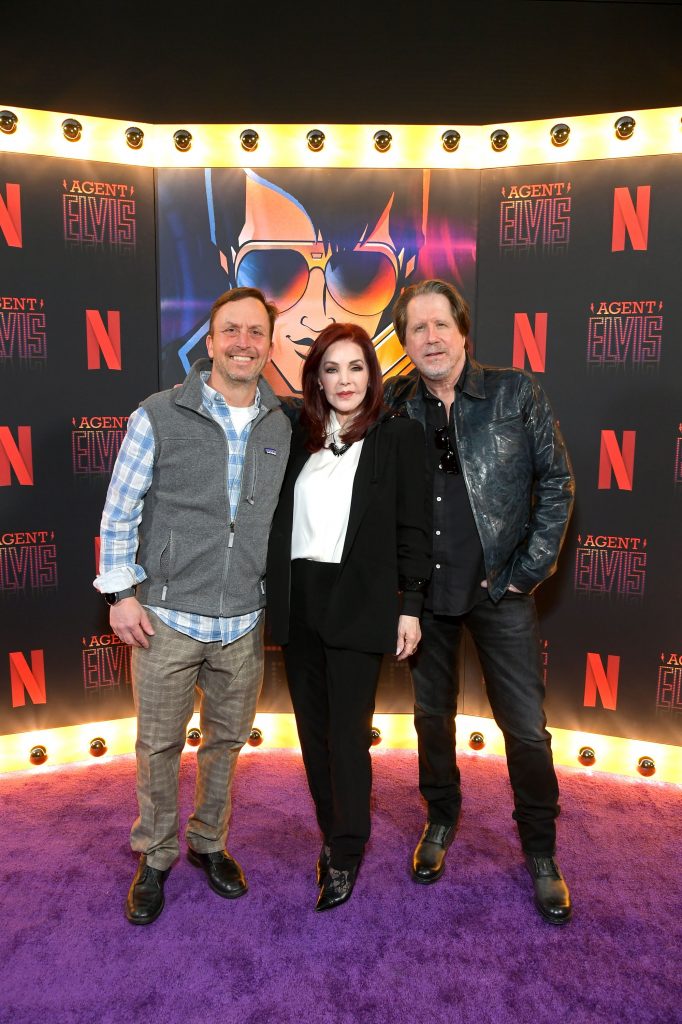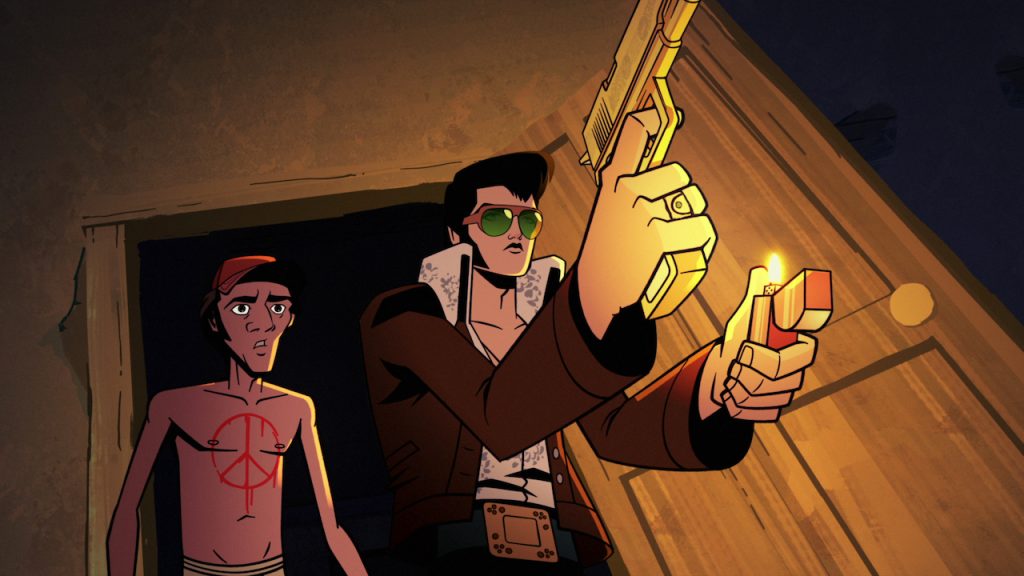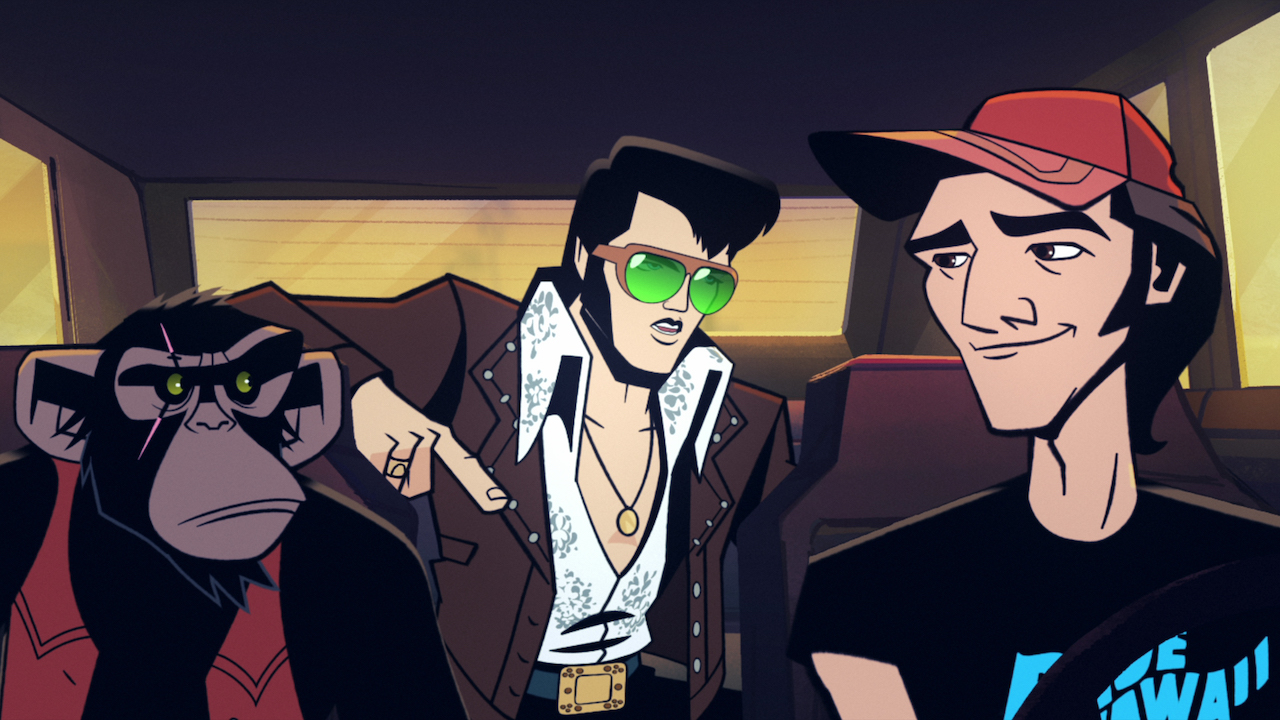Rock star by day and undercover spy by night. Or is that the other way around? Agent Elvis (Matthew McConaughey) shakes and swivels his hips to battle dark forces with The Central Bureau (TCB) in this irreverent animated TV series.
We spoke with writers/ executive producers John Eddie and Mike Arnold about the genesis of the idea when Eddie was traveling the country in a tour bus with his band over a decade ago. Eddie pitched the kernel of the idea of Agent Elvis to Priscilla Presley in 2013 and she responded favorably. “It was inspired by the very famous photo of Elvis and Richard Nixon where Elvis offered his services as a DEA agent to battle the dark forces of drugs and counterculture,” recalls Eddie. This became the impetus for the show.
Elvis Presley always had a fondness for law enforcement and stopping the flow of drugs across America. Mike Arnold added that an animated format was the most appropriate for the series because the various actors that played Elvis after his passing in 1977 never fully captured his spirit. “I thought if we did an animated TV series, we could have some control over making it look as much like Elvis as possible,” says Arnold.
An image of a coked-up chimp named Scatter and a shot gun next to him was the starting image for Mike Arnold. (Elvis really did have a chimpanzee called Scatter). “Ours is a coked-up ex-Navy Seal who happens to be a weapons expert,” quips Eddie.
“We began world building from there and bringing all these wonderful characters to life in a mysterious spy agency TCB that tracks back over the centuries. It’s a fun idea to explore because it allows us to get into that ‘Forest Gump’ aspect of the show,” continues Arnold.
Priscilla Presley was instrumental in setting up Agent Elvis at Netflix. She knew him better than anyone else in the creative team and was understandably protective of his memory and iconic status in popular culture. “She had so many real stories about Elvis. He even rode along with Sheriff departments around the country,” elaborates Eddie.

Mike Arnold, Priscilla Presley & John Eddie. Photo by Charley Gallay/Getty Images for Neflix
One story in particular occurred when Elvis once stopped a fight at a gas station in Los Angeles according to Priscilla with the words “Whoa Whoa Whoa.”
“We would take bits and pieces of stories Priscilla would tell us, or various quirks about Elvis, and we would find a way to integrate them into our stories. There are lots of Easter eggs in our show for hardcore Elvis fans and also for pop culture fans that might not have anything to do with Elvis,” adds Eddie.
John Eddie quotes a scene in the second episode of the series when Scatter throws up a very famous license plate on a roulette table in Las Vegas. Eddie and Arnold took great delight in sprinkling those little moments into Agent Elvis to see if the audience could identify the references. If not, the story still made sense.
The creative teams at Sony Animation and Netflix were fully supportive of their vision. “They were wildly helpful, very permissive, understanding, and embraced what we were doing,” remarks Eddie. They got it!
Priscilla Presley often referenced Elvis Presley’s “oblique sense of humor.” Eddie adds, “Priscilla would tell us that Elvis’ favorite movies were Monty Python’s Holy Grail and many Mel Brooks movies.” Team Eddie and Arnold are grateful that Priscilla gave them so much creative control of the comedic tone of Agent Elvis in a direction that a hardcore Elvis fan might not. “She realized we were building a fictional Elvis in an alternate reality. It’s not a biopic,” states Eddie.
After ruminating for several years, John and Priscilla finally pitched Agent Elvis to Sony Animation. “We always said, ‘There are two versions of this show. There’s the stupid version and the cool version. And hopefully we’ll pitch the cool version” says Eddie.
“I said it’s animated Elvis fighting crime. It’s adult animation as if directed by Quentin Tarantino. I want there to be violence, blood, sex, and drugs. I want to capture the times. We start in 1968, and go up to the early 70s in season one,” continues Eddie. “It’s darkly funny. We want it to be hard hitting. We want it to be real.”
Constructing an alternate Elvis is harder than it sounds. “We were living out our fantasy in a small way for him. We felt that with that starting point, we were already being loyal to who he was. But then, when you dive into the details, you look at his clothes and all the work by John Varvatos assembling his outfits for the show. We paid particular attention to detail with the cars we used and tried to use actual vehicles that Elvis owned and be loyal to the look of his house,” recalls Arnold.
Let’s make each as real an Elvis moment as it can be – Mike Arnold
The writers consider Agent Elvis to be an idealized version of Elvis, especially in 1968 when he was at his peak. It was when Elvis wore black leather suits and jumpsuits with a huge belt buckle and a superhero cape.
Elvis was always going to be cool. He was never going to be drug-addicted or fat or abusive. “Elvis is always going to be a badass in Agent Elvis,” declares Eddie.
This approach was always going to be a narrow tightrope to walk. They take Elvis as close to the edge without pushing him over the cliff into Cartoon Elvis.
“There’s a certain element of grounding that goes with being so cool. It is in a way a grounded world while we move into kind of crazy things from space, to volcanoes, to fake moon landings,” says Eddie. Cool Elvis was accurately portrayed by the hyper cool Matthew McConaughey and that Southern drawl.
Elvis stays cool while the world around him can be wacky
Eddie and Arnold would occasionally inject “actual words and dialogue Elvis had said in life like about the Vietnam War and about when people attacked him about appropriating black music,” expands Eddie.
“We used actual things that he had said because we wanted to give them weight. We wanted to let Elvis’s views be known that were from interviews and stuff like that. And then we added something crazy with Scatter,” jokes Eddie.
Matthew McConaughey brought more than dialogue and gestures to Elvis. “He brought a swagger and the coolness to a degree that we didn’t really think was possible. It was so effortless. It sounded so right. He worked really hard to nail down what he called the ‘music of Elvis’s voice, ‘the rhythm that was within his voice because Elvis has a very distinctive, even-speaking voice,” continues Eddie. McConaughey wasn’t trying to be an Elvis impersonator, but if you watch the show, “you very quickly forget you’re hearing Matthew McConaughey.”
Eddie quoted dialogue that McConaughey invented in a scene where Elvis meets the Manson girls. “Lady one, Lady two, Lady three. That was a Matthew-ism,” laughs Eddie.
Building The Agent Elvis Engine
John Eddie and Mike Arnold opted for the Forest Gump timeline where Agent Elvis intersects with historical events with a Quentin Tarantino attitude early on.

Bobby Ray (Johnny Knoxville) & Agent Elvis (Matthew McConaughey) Photo courtesy of Netflix
“Robert Valley, who did the character designs, was the first person that sent us something and we said, “We’re not looking any further. This is the look of the show. And we started building the show around Valley’s character designs,” adds Eddie. Fashion icon John Varvatos designed the costumes. Elvis Presley was initially captivated by the look of Tony Curtis. “He was one of a kind. He was his own guy with his own taste in his own world,” says Priscilla Presley. “We want to introduce Elvis to you today so you can see why he was so famous,” she adds. “He always wanted to be in law enforcement, but didn’t make it.”
Co-executive producer Fletcher Moules referenced the films of late 60s and early 70s cinema to further shape the look of the show. He looked at Grindhouse cinema and used split screens in the show. They also considered the work of director Sam Peckinpah to layer in the excessive violence.
Mike Arnold previously worked on the Archer, the animated spy series which offered some influences on Agent Elvis. “Perhaps reminiscent of Archer is the tempo of our dialogue, the nature of the mayhem and the comedy, and group service,” says Arnold. That is where he wants the similarities to end.
When Mike Arnold met John Eddie, he sent him a five page writing sample of a potential scene and he loved it. They began to write with a “not Archer” philosophy. “It’s also Austin Powers and Matt Helm,” interjects Eddie. Agent Elvis also references iconic shows like Star Trek and glimpses of Mission Impossible.
Arnold encourages other writers to pitch their own take on the material. “I’m a big believer who encourages all writers to sit down and just start writing it. And that’s really for any project. Put it out there, take the chance. And sometimes, all you can say is, this is what I do,” advises Arnold.
Agent Elvis is surrounded by a motley crew of supporting characters. There’s CeCe Ryder (Kaitlin Olson), Bobby Ray (Johnny Knoxville), Bertie (Niecy Nash) and The Commander of TCB (Don Cheadle). The writers posit that CeCe was probably the most influential on Elvis. “CeCe is almost ever present around him as he walks into this new world. We see them grow a little bit closer and a little bit tighter as they become accustomed to each other’s dysfunction during the course of the show.”
The Commander also brings his own “degree of fun crazy in the constant battle of wills of who’s actually giving the orders.” Elvis was always used to being in control and constantly challenged The Commander’s authority.
Each character has their own vocabulary that the writers could explore as the show progressed.
When writing an outsized character like Elvis, there are many viewpoints and creative opinions to consider. “The challenge was how to incorporate all these ideas and get our show going in a way that’s satisfying from all these different perspectives,” says Arnold.
It’s a balancing act to cater to the lifelong core of Elvis fans as well as the newcomers. Agent Elvis also included a range of cameos to build momentum.
Although John Eddie came up with the original idea and Priscilla Presley helped him flesh it out, “Mike was very helpful and he really respected this world that Priscilla and I had brought to him,” articulates Eddie. “We had laid out all these layers that we envisioned. Mike always said, ‘Okay, we need to keep it snappy, keep a joke coming here, but still have it make sense and be fun.”
Agent Elvis is a wild ride, but you need to hold on tight. Says Eddie of the most defining moment in the show, “To me, it might be the cameo that this is your journey, the journey of America, and then you make out with the nun.”
Mike Arnold quotes the moment, “If I wanted to hang out with a bunch of dirtbag hippies that returned Dennis Hopper’s phone calls…” Elvis was spouting lines when he’s about to get killed. “He was trying to bring some sanity into a crazy world.”
Priscilla Presley often spoke of Elvis’ oblique sense of humor. “If he couldn’t sing he should have just done stand-up because he’s really quite entertaining.“
